
Most Read

Wait! That Walmart Giveaway Text May be a Scam!

Refurbished iPhones: They're Cheaper, But Are They Worth It?

How Do You Beat Gift Card Scams? Never Pay Using Gift Cards

How to Tell if Nikes Are Fakes: From Tags to the Stitching
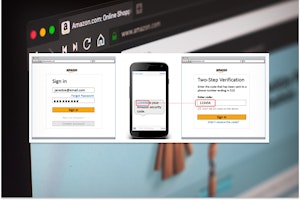
Received an Amazon OTP Text? It Could Be a Scam
Walmart In Depth
Whether you find an excuse to shop there all the time or have simply stopped in for a last-minute purchase, the odds are good that you’ve been to a Walmart.
The modern-day department store has taken the U.S.—and much of the world—by storm since it was founded by Sam Walton back in 1962. From its humble beginnings in Rogers, Arkansas, the store has grown to a mega-presence, planting roots in more than 10,000 locations across over 20 countries and every continent outside Antarctica.
With offerings ranging from diapers to dresses, camping gear to home decor, makeup to mouse traps, and everything in-between, Walmart offers true one-stop shopping—all at affordable prices.
But Walmart isn’t just a favorite of savvy shoppers. Scammers have found numerous ways to drag the company into their schemes, including Walmart email scams, Walmart online scams, and many other Walmart-related plots.
Learn more about Walmart scams, what they look like, how they operate, and what you can do about them to help you stay aware and, most importantly, safe.
Types of Walmart Scams
One of the reasons Walmart scams are so persistent is because the company is so well known.
Scammers trade on the trust consumers already have in the brand to trick people into believing them, which is why most Walmart scams masquerade as messages from the company itself.
Walmart Giveaway Scam
One of the many different Walmart online scams, there may be several different versions of this scheme.
Typically, it starts with a social media post. Pages pretending to be Walmart or people pretending to work for them will post about some sort of giveaway the company is supposedly doing. A recent example saw social media posts promoting a gift bag giveaway to celebrate Walmart’s decision to stop using plastic bags.
But regardless of the specifics, the endgame is always the same. The post will direct you to some sort of website where you’ll be asked to enter personal information to be eligible for the giveaway. Of course, that information is only sent to scammers. 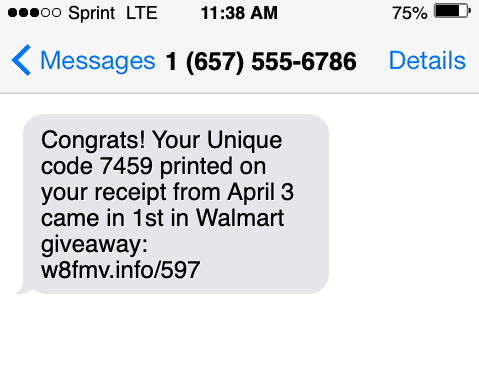
Walmart Mystery Shopper Scam
In another scheme where scammers pretend to be Walmart, a letter is sent out at random, telling recipients that they’re being paid for participating in a mystery shopper survey.
The letter will include a check and detailed instructions on how to cash it, then inform you that you’ll have to send a large portion of the money back to redeem your payment.
If getting money for nothing wasn’t enough indication, the complicated directions should be—this is a scam, and the money will get taken directly from your bank account and transferred to a scammer.
Walmart Gift Card Scam
Many scammers rely on this type of plot to take your money.
Many Walmart gift card scams target sites like Craigslist or eBay but also come in the form of scammers pretending to work for other companies that collect dues, including:
- Utility companies
- Insurance companies
- Bail bond agents
Either way, the scammer will ask you to pay them by putting a certain amount of money on Walmart gift cards, then giving them the codes on the back of the cards. This gives the scammer access to all the money you put on the card—but it will never actually count toward paying off your debt.
Walmart Email Scam
Again, there are numerous different versions of this phishing scam, which involves scammers reaching out by email in an attempt to gather your details.
One of the more recent iterations of this Walmart scam involved emails sent to customers claiming something was wrong with their package delivery. Other versions of this scam might look like delivery invoices or emails sent from Walmart’s security team to warn you about a problem with your online account.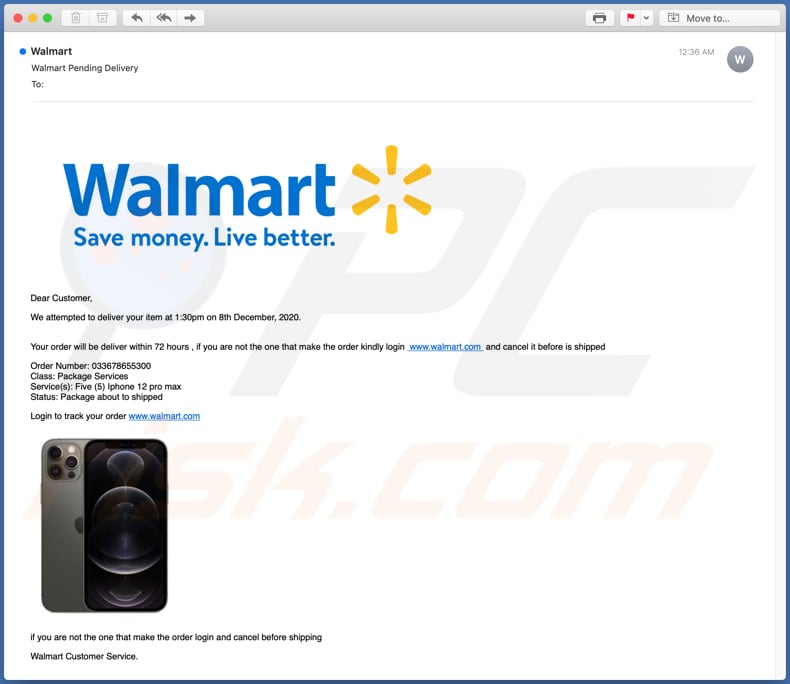
Still, in all of these cases, the cleverly crafted emails are sent by scammers hoping to scope up sensitive information.
Walmart In-Store Experience Survey Scam
This one can get a bit tricky since Walmart actually does have an in-store experience survey. The company also does legitimately holds sweepstakes for those who complete the survey.
However, scammers take advantage of these real-life deals. They send a message telling you you’ve won the sweepstakes, then ask you to either enter personal or sensitive information—like your bank account details—or send a fee to recoup the money. These are both ways to scam you.
How to Beat Walmart Scams
Since Walmart scams run the gamut, there could be any number of things to look out for. But if you stay wary and read carefully (or through the lines), there are a few reliable red flags that may help you detect what’s going on, regardless of how the scam is set up.
Some universal signs of scams include:
- Strange or poor grammar, incomplete sentences, or strange turns of phrase
- A feeling of urgency. The message is urging you to act quickly
- Graphic design details that don’t match the company’s. This includes:
- Colors
- Logos
- Size, shape, and type of font
- Mottos or taglines
- Lack of details—especially true if it involves an email about a delivery issue
- Walmart will always include details within the email and never make you click a link for more information.
- An overly emotional story
- An overly complicated method of payment
Other things to watch for when dealing with a Walmart online scam include:
- Email addresses: Make sure they come from the company’s official email domain, @walmart.com.
- Links: Hover your mouse over a link to see where it’s directing you without clicking on it.
- Make sure the address is an official Walmart domain.
- The “To” line: Look out for multiple email addresses or “undisclosed recipients.”
And remember: The best way to beat a scam is to not interact with it. That means:
- Don’t click on links. If you want to look at something, always enter Walmart’s website domain in a separate window.
- Never pay for something with a gift card. They are never acceptable forms of currency.
- Don’t give away any personal information. That includes your:
- Full name/mother’s maiden name.
- Date or place of birth.
- Credit card or bank account numbers.
- PINa or passwords.
- Login information.
- Never deposit checks from someone you don’t know.
Protection for Customers from Walmart Scams
Unfortunately, Walmart doesn’t offer much in the way of customer scam protection.
The company does note that it will never give away gift cards or other prizes via text message or on social media, including:
Walmart also notes that it will only communicate via phone and certified mail when reaching out to customers with sweepstakes information.
Other than that, the best offense is a good defense. Make sure you keep the tips above in mind and stay wary when interacting with any posts, emails, texts, letters, or messages that supposedly come from the company.
You can also shore up your online security in general by making sure your passwords are unique and hard to guess.
It's important to verify links and contact details to beat imposters.
If you do think you’ve been scammed, you should strongly consider:
- Reporting the incident to:
- Your bank and credit card companies.
- The Federal Trade Commission.
- Freezing any credit or debit cards involved.
- Changing all of your passwords.
- Keeping a close eye on your financial accounts and activity.
- Contacting your local authorities.
And remember: If something seems too good to be true, it more than often is!
Scams Impacting Walmart

Wait! That Walmart Giveaway Text May be a Scam!
Fake texts are being sent to consumers claiming a hefty sum is waiting for them on a Walmart gift card, but falling for this scam puts you at risk of identity theft.

How Do You Beat Gift Card Scams? Never Pay Using Gift Cards
Beating this scam is simple—don't pay for anything using gift cards and don't give anyone you don't know or trust your gift card information.

Received an Amazon OTP Text? It Could Be a Scam
If you received an Amazon OTP text message out of the blue, it could be a sign that someone else is trying to log into your account.
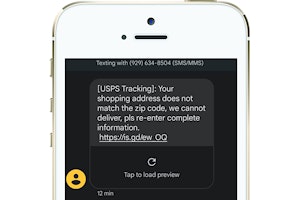
Fake USPS Text Messages Steal Your Amazon Login
Beware of fake USPS text messages that claim your address doesn’t match your zip code—it’s a scam to steal your Amazon login credentials.

Fake Amazon Calls Expose Users to Phishing Attempts
If you receive a call from Amazon about suspicious activity on your account, it's likely a scam, and you should hang up immediately.

How to Beat "Amazon Prime Renewal" Phone Scams
This scam starts with a recorded message about an early (or unwanted) Amazon Prime renewal. To 'cancel,' you will unknowingly be transferred to a scammer impersonating 'Amazon.'

Common Amazon Scam Texts and How to Protect Yourself
If you're one of the millions of people who buy products from Amazon, you've likely received a text message or two that seem a bit suspicious. We teach you how to identify a fake text and avoid being scammed.
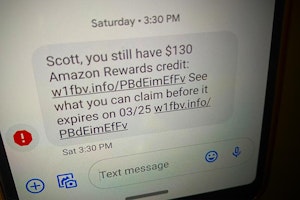
Have You Claimed Amazon Rewards Credit? You May Have Been Scammed
Don't get too excited if you receive a text message from "Amazon" claiming you've won a prize—scammers are impersonating the brand in this phishing scam.

Amazon Brushing Scam: Receiving Packages You Didn't Order
Received an Amazon package that you didn't order? Check your account—scammers could be posting fake reviews on your behalf.

Amazon OTP Delivery Email: Protection Against Fraud
You can fight scammers who order big-ticket items from your Amazon account with a one-time password that stops them from receiving the item.
Guides To Protect Against Retail/Sales Scams

Refurbished iPhones: They're Cheaper, But Are They Worth It?
If you need a new iPhone but don't want to pay close to $1,000 for one of the latest models, you may want to check out refurbished models—you could save yourself hundreds of dollars.

How to Tell if Nikes Are Fakes: From Tags to the Stitching
Nike is one of the biggest brands targeted by counterfeiters and scammers - be extra careful with Nike products from non-official retailers as you could end up with a fake

How to View Your Amazon Archived Orders & Hide Search History
If you share your account with multiple users, archiving your past orders is a good way to keep others from seeing your orders and ruining a surprise or seeing private orders.
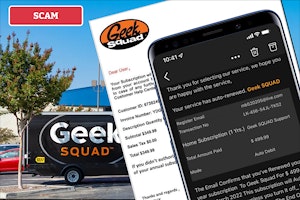
How to Guide: Avoiding Geek Squad Auto-Renew Scam Emails
If you get an auto-renewal email from Geek Squad subscription, beware it could be a scam.

How to Claim Free Grubhub Delivery for a Year with Amazon Prime
Amazon's acquisition of 2% of Just Eat Takeaway is good news for Amazon Prime subscribers—free food delivery from Grubhub is just a few clicks away.
News About Retail/Sales Scams

Nike Teams Up with U.S. Customs to Stop Counterfeiters
Nike is taking a stand against counterfeiters and stopping fake products before they hit U.S. soil.

Urgent CDC Warning: Eye Drops Linked to 3 Deaths, Loss of Vision
The CDC is warning eye drops users of a rare bacterial infection from 2 brands of eye drops. The infection is resistant to antibiotics and has resulted in the loss of vision, loss of eyeballs and the death of 3 patients.

Banks May Refund More Zelle Scam Victims in 2023
Zelle scams have reached a serious volume. New reports suggest that banks are looking at new refund protections for customers in 2023.

Optus Data Breach - One of the Worst Cyberattacks in Australia
Hackers have gained access to 9.8 million customer records from Optus in Australia, exposing personal information such as driver licence, medicare and passport details.

Roe vs. Wade Overturned: Abortion Rights in Your State
Find out what the overturning of Roe vs. Wade means for abortion rights in your state.